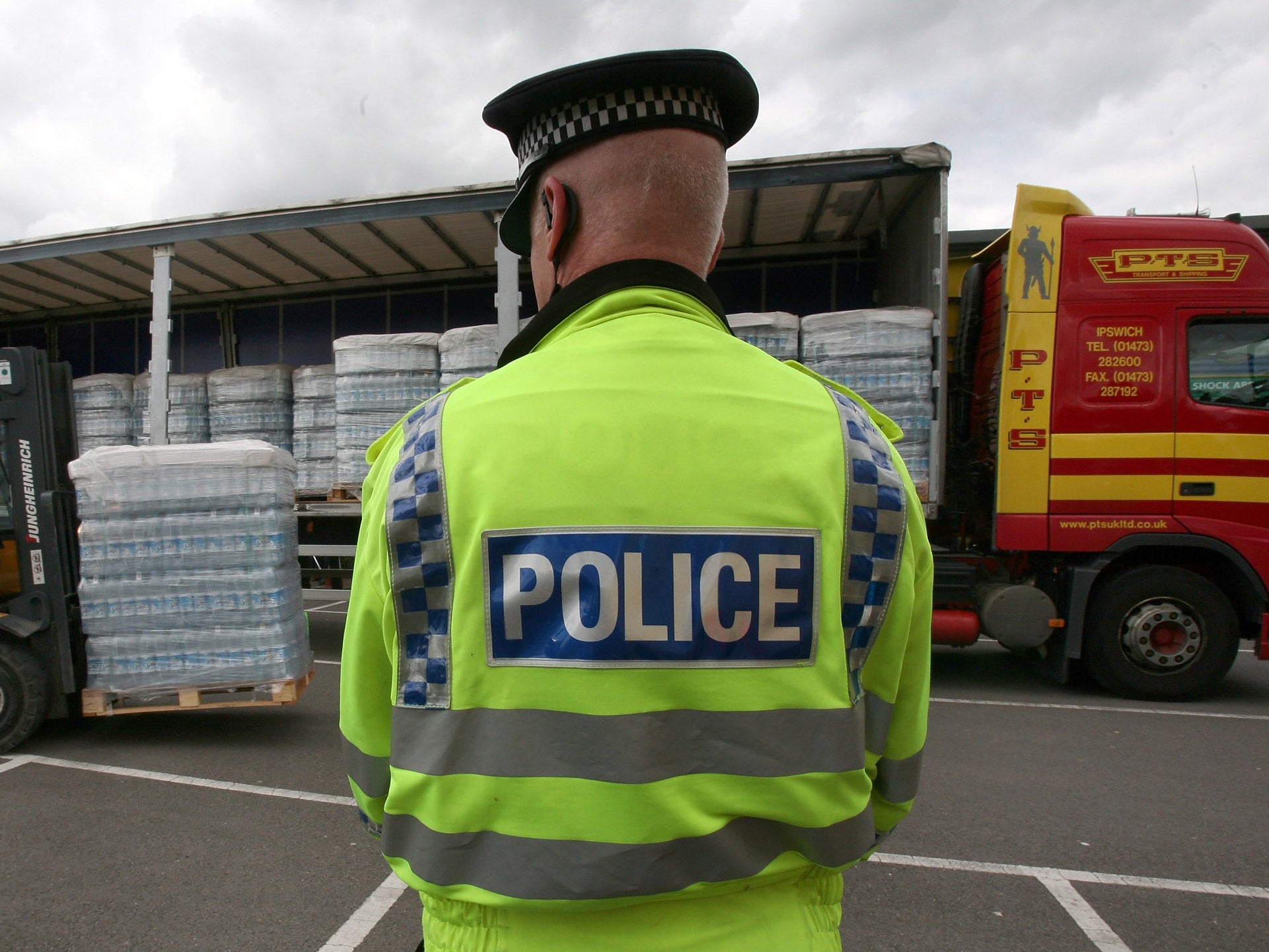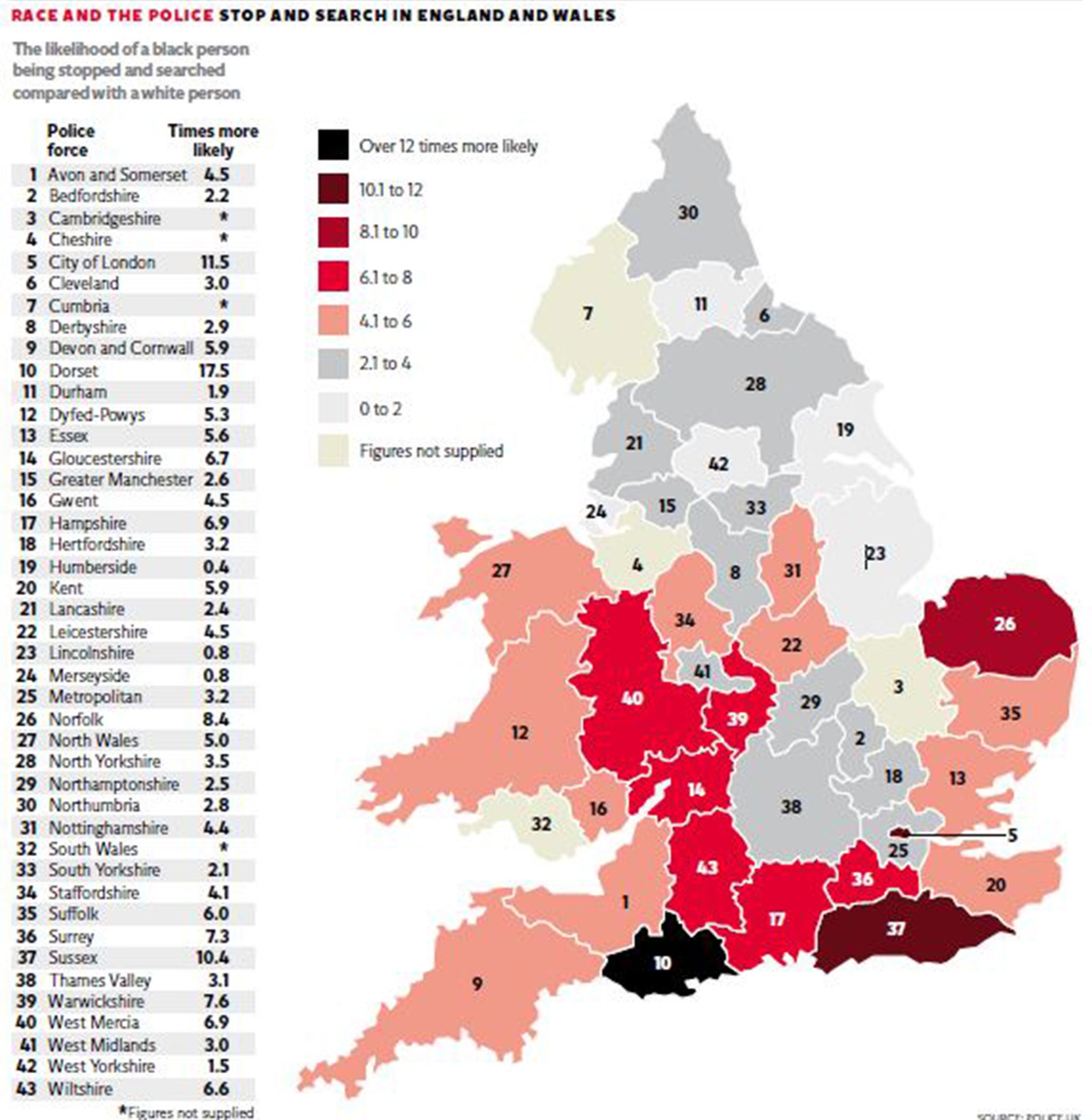Black people still far more likely to be stopped and searched by police than other ethnic groups
In Dorset a black person was 17 times more likely to be stopped and searched

Black people are still far more likely than other ethnic groups to be stopped and searched in almost every part of England and Wales despite concerted efforts to tackle the problem.
The disclosure – following publication of detailed data from 39 forces – led to warnings that the continued “racial bias” would harm relations between minority communities and the police.
An analysis by The Independent has established that in 36 of the forces black people are being targeted more than their white fellow citizens for the intrusive searches.
In one county – Dorset – a black person was 17 times more likely to be stopped and searched than a white person, the figures showed.
The statistics also revealed that less than a quarter of the searches resulted in an arrest – with a far lower proportion in most areas – which will fuel complaints that police are still too willing to employ their search powers.
The picture emerged in the first detailed publication of force-by-force figures. It follows a warning by Theresa May, the Home Secretary, that she is prepared to legislate to curb the “excessive and disproportionate” use of the powers if the police record does not improve. The biggest disparity emerged in Dorset, where 200 stop and searches were carried out on black people between December 2014 and April 2015. According to the latest census figures, the county is home to just 3,200 black people.

Over the same period 2,549 stop and searches were conducted on Dorset’s white population of 714,600, making it 17.5 times more likely that a black person was targeted. The force partly attributed the figure to operations against drug gangs and to its black population being underestimated.
The ratio was 10.5 in Sussex, while other high figures were recorded in Norfolk (8.4), Warwickshire (7.6) and Surrey (7.3). In London, a black person was 3.2 times more likely to be stopped and searched than a white person, with slightly lower ratios in the large urban forces of the West Midlands (3.0), Greater Manchester (2.6) and South Yorkshire (2.1).
Only in Lincolnshire, Humberside and Merseyside were they less likely to be searched than white people.
The statistics, which were released on the police.uk website, also covered the ages of those searched and times that stop and searches were conducted. Overall the figures indicate some progress is being made in treating groups more equally following earlier studies suggesting black people were seven times more likely to be stopped.
But Isabella Sankey, the policy director for Liberty, said the statistics showed ethnic minorities were still being disproportionately targeted 16 years after the Macpherson report into the investigation of Stephen Lawrence’s murder denounced “institutional racism” in the Met and other forces. She said: “An overall reduction in the number of stop and searches is welcome, but while such racial bias continues, distrust between the police and the communities they are supposed to serve will only grow.”
Jack Dromey, the shadow policing minister, said: “It cannot be right that if you are black you are much more likely to be stopped and searched than if you are white. If done without justification, it is potentially unlawful and certainly damaging to the confidence of black people in the police.
“To the credit of the leadership of the police, great efforts to get the balance right are under way but these disturbing statistics demonstrate there is a long way to go yet.”
Taher Gulamhussein, spokesman for the campaign group StopWatch, said: “The level of racial disparity is unfair. There is no explanation offered that provides a justification. With the majority of searches resulting in no arrest or other police outcome, this highlights that most searches were fruitless and therefore not an effective use of police time.”
A Dorset Police spokesman said: “The census records the resident population of a county. However, it does not capture the amount of people who visit Dorset, including many holidaymakers, and people who temporarily live in the county for a period of time. We believe this is a contributing factor to the stop-and-search figures.
“It is also important to understand that Dorset Police is actively targeting a number of criminal gangs in Dorset. Some of these gangs include members of the black community who are residents of the county and do not feature in the census data for Dorset. We regularly meet with all of our communities in Dorset who support our approach and do not want us to let up on our pursuit of these criminals.”
A Sussex Police spokesman said: “We believe this is a spike related to operations conducted during the period in the Worthing, Adur and Arun areas that were targeting gangs, predominantly from London, coming into the county to deal drugs.”
Ms May said the publication of the statistics was “a further step forward in the Government’s commitment to increasing the transparency of the police and ensuring the public can hold their force to account”.
Deputy Chief Constable Adrian Hanstock, the National Police Chiefs’ Council lead on stop and search, said: “It is important that we do not lose sight of the fact that, on a daily basis, officers utilising the stop-and-search power are finding weapons, stolen property and drugs.
“The people committing a criminal act by carrying these items are the same people who can make communities less safe, and police must have appropriate powers at their disposal to find and deal with them.”
